|
Halloween is two days away, and today is Part 6 of a short story from my compendium "The Illusion Exotic". I'll run an installment each day leading up to Halloween. If you missed Part 1, you can catch up here. THE CAVE, Part 6 A former Civil War soldier embarks on a quest on behalf of his former commander. He expects to find outlaws and gunslingers in the high deserts of New Mexico, but instead stumbles upon death incarnate. "The Cave", & "The Illusion Exotic, "Copyright 2016 Brian L. Braden Formed by successive floods, heaps of gray scrub oak and rotting pinion formed a wall guarding the cave’s mouth like ragged teeth. Death lurked in there, every bit as grim as Amado and Townsend described. Josefita’s words came back to him...you will need more than fire and steel. Knight cocked the Colt’s hammer. Fire and steel will have to do. He stepped gingerly over the woodpile looking for the telltale sign where men had repeatedly transversed the heap. Knight quickly found a path of flattened sticks and followed it. Immediately after clearing the woodpile, Knight spotted the first bones. Covered with tattered flesh, they formed a scattered trail stretching into the dark recesses. Then the hot, putrid reek of rotting flesh assaulted him, along with the deafening buzz of a million flies. Knight pulled a flask of rye from his coat and took a long pull. He poured some over his bandana and tied it over his face. Returning the flask in his pocket, he knelt down examined the cave floor. Once again, the tracks told the story. Knight slipped deeper into the cave until the sloping roof forced him to stoop. That’s where he found the pile, exactly as Amado and Townsend described it. Clouds of black flies ebbed so thick they partially obscured the flesh mound. Arms, legs and bloodstained indian garb poked out from sheets of squirming maggots. Fighting an overpowering urge to vomit, his nostrils rebelled against an unholy stench the bandana did little to curb. Knight wasn’t familiar with the local savages, but he felt confident these weren’t white men. The corpses weren’t piled as much as stuffed into the back of the cave, new corpses tossed atop the old ones instead of spreading the pile out in the ample cave. The pile looks compressed. It’s been arranged. Beyond the scene’s sheer horror, that fact puzzled him. Knight glanced back at the bright entrance. The bone trail leading to the cave’s mouth obviously came from the older bodies near the bottom. Four men have been here. Amado’s, Townsend’s, and perhaps Wellsby’s tracks were several weeks old and easy to spot: straight in, straight out and close to one another like frightened creatures. The fourth set of boot tracks cut fresh and deep and bold across the cave floor, proclaiming the predator’s lair. The only scavenger tracks were those of the freshly killed coyote, and its tracks only meekly penetrated beyond the woodpile. It snatched the first scrap it found and high tailed out. Every critter for miles around should have been in here, feasting and dragging the carcasses up and down the riverbed. The only buzzards he saw were freshly arrived and circling over the dead coyote outside. From First Manassas to Gettysburg, Knight had witnessed fields of blood and carnage. Nature wasted no time feeding on war’s grim bounty, but here only flies reported for duty. The evil that repelled the scavengers began to seep into his bones. As bad as he wanted to run, grim duty kept his boots planted in the cave. If the bone trail leads from the center of the pile, it means someone needed to make room. Knight returned to the woodpile, thankful for the fresh air. He removed his drover coat and pulled a pair of leather gloves from its inner pocket. He laid the coat over the pile, rolled up his sleeves, and donned the gloves. That’s when a thought occurred to him. He looked back at the cave floor, and blew out a long breath of air between his teeth. There weren’t any signs of bodies being dragged, either inside or outside the cave. That’s why the killer’s tracks are so deep. He carried them, perhaps for miles. Returning to the corpses, Knight pulled on a rotted leg protruding midway down the pile. At first it didn’t budge, but his efforts released a fresh wave of foulness along with a cloud of flies. Knight coughed and fought for breath as he pulled again. The body slid out with a wet sucking sound. On a hundred battlefields Knight had never seen a corpse like this. The indian, perhaps in his late teens, had been here over a week, but wasn’t as stiff and bloated as would be expected. All the dead grow pale, but even a red savage wouldn’t be this eerily white, even after a week. Then he saw how the indian died. The man’s blood had been drained through a long gash ripped into his neck. Knight looked around, but there was no evidence of mass bloodletting anywhere in the cave. He wasn’t killed here. He pulled another corpse from the pile, this time an older man. He died the same way. Another older, badly decomposed body told the same story. He examined their necks more closely, trying to deduce the weapon that inflicted the killing wounds. “Knight, you alright in there?” came Townsend’s voice from beyond the cave. “I’m alright,” he yelled back. “But I reckon you won’t be if you don’t high-tail it back to that‘X’.” “I ain’t moved, Mr. Knight.” Townsend responded a moment later in a fainter, more distant voice. Knight leaned closer over the dead. No other wounds were apparent, only the gashes which delivered the killing stroke. Too jagged for a knife...maybe a saw? He peered closer at the necrotizing flesh, occasionally flicking away a maggot. Knight couldn’t believe what his eyes told him, but the dead don’t lie. Chew marks. Bites. “Poor bastards.” As a deputy in Kansas City, he once investigated a prostitute’s murder. Something about these bodies reminded him of that brutal violation. He examined the rest of the three corpses and discovered bruises around their wrists. Someone very powerful pinned them down, ripped open their necks and drained every ounce of blood from their dying bodies. They didn’t struggle much, and that he didn’t understand. They all looked to have been strong bucks. Shaking, Knight stood and took several deep breaths. He placed his hand on the holstered Colt until the trembling ceased. Looking back at the cave entrance, the light slowly dimmed as the day wore on. The tracks in and around the cave gave Knight confidence Townsend wasn’t responsible for this atrocity. The evil here wasn’t indian handiwork, either. Even the monstrous Comanche had never done anything like this before. Knight battled the urge to bolt, but an unseen force held him. He glanced back at the pile and saw black fabric poking from beneath an indian leg. Knight shoved the leg aside and discovered a hand and arm wearing a white man’s coat. Knight grabbed the sleeve and tugged at the body buried deep inside the pile. Initially, it wouldn’t budge. Knight dug in his heels and turned his head against the hellish fume rising from the heart of the pile. The body broke free as corpses tumbled right and left, leaving a stinking valley in the death mound. Knight gasped for air and took a long pull from his flask before examining the new corpse, two holstered pistols strapped to its hips. “Wellsby.” He’d never met the man, but felt sure it was him. A tin star topped Wellsby’s black overcoat, his white shirt now stained with rot from his new companions. Wellsby died differently from the rest. His mustachioed face was purple and bloated, his body stiff with rigor mortis. Bruises encircled the lawman’s throat, but the neck wasn’t ripped open. Someone snapped Wellsby’s neck with bare hands before the sheriff could even draw, carried the big man here, and then stuffed him deep inside the pile like a rag doll. Probably a hard man, Knight knew someone like Wellsby didn’t have his neck snapped easily. Still leaning down, Knight caught a faint scent hiding beneath the blanket of rot and decay. A familiar scent. Knight pulled down the whisky soaked bandana, closed his eyes, and whiffed the air. At first, the putrid rot overwhelmed his senses, but then he caught it again. Wincing, he filled his lungs again and again, leaning over the pile like a chef taking in the aroma of the day’s soup. Whisky. This wasn’t the hard-edged old rye soaking his bandana, but a sweeter, more refined aroma of Kentucky sour-mash. (to be continued tomorrow) 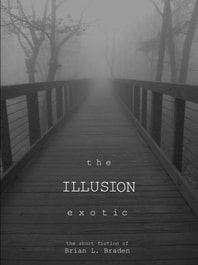 I hope you enjoyed this installment of THE CAVE. It will continue tomorrow on The Illusion Exotic and conclude on Halloween! Can't wait to find out what happens? You can get The Illusion Exotic here, featuring The Cave and other short stories. #shortstory #horror #halloween #spooky #western #serial *** If you enjoyed this blog, please like the post and leave a comment or if you're feeling brave, share it on social media. This platform is my entire advertising budget and is how I share the word on my books. Also visit my Facebook, my author page and check out my photography book from America Through Time, "Abandoned Wiregrass: The Deepest South's Lost and Forgotten Places."
0 Comments
Halloween is quickly approaching, and today is Part 2 of a short story from my compendium "The Illusion Exotic". I'll run an installment each day leading up to Halloween. If you missed Part 1, you can catch up here. THE CAVE, Part 2 A former Civil War soldier embarks on a quest on behalf of his former commander. He expects to find outlaws and gunslingers in the high deserts of New Mexico, but instead stumbles upon death incarnate. "The Cave", & "The Illusion Exotic, "Copyright 2016 Brian L. Braden The horse drank by the mountain stream while Knight slept in the saddle. Late afternoon sunlight danced off the last of the cold snowmelt. Soon, the first snows would seal the mountains to the north and east, barring his way back to Colorado. It didn’t matter; he wasn’t coming back this way until next summer. For now, however, the only thing falling was the leaves from the cottonwoods and aspens. A breath of cool, dry mountain air woke him. He looked up and around. The sun shines harder here. Mountains capped with strips of old snow stood boldly against the pale blue sky in the west and north. Knight gently spurred his horse. They ambled down the mountain, following the golden trail of cottonwoods into the fertile Chama Valley. The setting sun blazed orange as he entered Espanola, a collection of low adobe huts, shacks, and tents. Children played in the dusty haze kicked up by wagons packed with railroad workers. Zuni Indian women sat cross-legged against southern facing walls. Wrapped in brightly colored blankets, their shadows lay crisp on white adobe. He found himself before a two-story adobe inn across from an old mission. A Mexican boy gladly accepted a U.S. nickel to feed and care for his horse. Outside the inn, several squat Zuni women in long dresses tended two hornos, adobe ovens. They took loaves of fresh bread, tortillas and steaming goat meat into the main kitchen though a side door. He stepped out of the cooling twilight into a warm main chamber packed with men crowded along several long tables. White men and Mexicans hunched over their mugs, eating with barely a word. Except for a crackling fire in the corner, an odd silence hung over the tavern. Knight made his way to an open bench. A plump indian girl ran a wet rag across the rough table in front of him. “You are not a worker,” she said matter-of-factly. “No, but my money is good. Now bring me something to eat.” She eyed him suspiciously and hurried off to the kitchen. Around the room, hardened gazes assessed Knight before going back to their business. After a few minutes, a sweaty man emerged from the kitchen, nervously wiping his hands on a dirty apron. “Señor Knight? Are you Señor Knight from the railroad?” Knight stood, towering above the elderly man with the refined Spanish accent. With bloodshot eyes, the Spaniard’s shoulders slumped as if under some invisible weight. Knight extended his hand. “I take it you are Señor Amado Lucero?” The Spaniard offered a weak smile and unsteady handshake. “Welcome to my establishment! Please, sit. Isobella, get our guest some warm bread and tequila. Please, sit my friend.” “Thank you.” Knight tipped his hat and sat back down. Patrons eyed Knight with renewed interest, perhaps wondering who merited Amado’s finest hospitality. “Isobella will take care of you,” Amado motioned to the plump indian girl. “I must tend to the kitchens. Once my patrons depart, if you are not too exhausted from your journey, we will discuss business. My daughter is preparing a room for you even now.” “Thank you kindly. General Palmer spoke highly of you and your dear family.” Amado winced, then smiled tightly and nodded. He curtly begged Knight’s pardon and disappeared into the kitchen. In a few minutes, Isobella placed a steaming plate of corn tortillas and shredded goat meat before him. The green and red chili spices didn’t sit too well with Knight’s bland Protestant palate, but it was hot with ample cool water to wash it down. Anyway, mountain air made a man plain hungry. He ate as quickly as the spicy food permitted, all the while observing the room around him. As the sun set outside, the fire cast long shadows across the mud walls and danced off the low-slung ceiling beams. Hard men, exhausted from their day’s labors, sat in near silence. They nursed whiskey or warm beer, but lacked spirit. More men streamed in, but few left. Soon, the serving girls lit lamps, banishing the shadows to the corners. Knight wiped his mouth and washed down the last of his meal. He’d seen this before. When men gather in fear, they are either overly boisterous or deathly quiet. Men are loud in the face of dangers they understand, but fall silent in the shadow of the unknown. He beckoned Isobella. “Bring me a whisky. I’ll take it on the porch. Tell Señor Amado he can meet me there when his business is complete.” Stares followed him as he departed. Knight stepped onto the front porch and leaned up against a post. He breathed in deeply, letting the night fill his lungs. A man could live on air this sweet. He struck a match, lit a freshly rolled Carolina tobacco cigarette and watched the blue smoke waft into the starry night. For a brief moment, he caught a whiff of something sickly sweet, but it vanished quickly on the breeze. Knight turned, and experienced the disturbingly rare sensation of being surprised. Dark almond eyes studied him intently from the edge of the porch. Never taking her gaze off of him, she emerged into the ruddy light. Stray tendrils of midnight hair, untouched by grey, escaped a bun and fell across perfect olive skin. She wore a kitchen apron over a blue velvet dress common for ladies in these parts. A brilliant turquoise crucifix on a silver necklace hung from her graceful neck. He cleared his throat and tipped his hat. “Ma’am. I didn’t mean to disturb you, I thought I was alone.” She slid onto the porch uncomfortably close to Knight, never releasing him from her stare. Her expression overflowed with goodness and sadness and a life fully lived. Finally, as if pitying Knight, she released him from her gaze and stared into the night. So this is the Spanish Lady. Along his journey the railway workers spoke reverently of the beautiful enchantress, a lady of noble Spanish blood who gave her heart to a lowly commoner, a simple innkeeper. For her, they fondly named this settlement Espanola. Even in a kitchen apron, her beauty surpassed any woman he’d ever seen, seemingly lighting the darkness around her. She finally spoke in a voice of satin and honey, “We came here when I was only a little girl. My father told me this place held old magic, a kind of magic the Church did not want to acknowledge. It’s old and pagan, as beautiful and terrible as a summer monsoon over the mesa. It’s in the air and you drink it like wine. I see it in the stars and in the sunrise over the mountains. When my father arranged my betrothal to a gentleman from Toledo, I pleaded with him not to separate me from this beautiful, enchanted land. I draw my strength from it, and fear I would wither if gone too long. I think this is why I married my dear Amado.” She smiled and drifted to a different place and time. Knight had seen hell so many times that a glimpse of grace stole his breath. Her voice poured over his soul like a spring Baptism, washing away a lifetime of blood and gunsmoke. Silas would have gladly spent the rest of his life in this moment, willingly trapped in the Spanish Lady’s power. He would do anything for her, she need only ask. She turned again to look upon Knight, but he could not hold her gaze. He looked down at his boots as the moment passed. “Forgive me, I have been working too long in the hot kitchens. Sometimes I get carried away. We are most grateful you arrived here safely. I am Josefita, Amado’s wife. Our daughter has prepared our finest room for your stay.” Finding his senses, Knight nodded and removed his hat. He searched for the right words and briefly thought about how her apron was strangely clean and white for someone working in the kitchens all day. He cleared his throat. “Of course, Señorita. General Palmer spoke glowingly of the hospitality of the house of Lucero. He sends his regards.” “I wish we could accommodate an agent of the railroad with a more gracious reception, but we have many mouths to feed. If Amado can be of any service, please do not hesitate to ask.” “Ahm...uh, yes ma’am. I most certainly will.” Suddenly, she stepped even closer to him and placed a hand on his arm. The coolness of her touch took him aback; the intensity shining from her face bewitched him yet again. “Dark tidings have befallen us. I don’t know what General Palmer told you before you came here, but what stirs in this valley is ancient sin brought to life. I know you are an earthly man, but you possess the gift to see what is unseen.” Her eyes bore deeper into him. “I fear you will need that gift... more than even fire and steel,” she whispered. Then, without another word, she turned and vanished around the corner. For a moment, he caught the sickly sweet odor yet again. Clouds now covered the stars as the night turned pitch black. A few ruddy lanterns spilled feeble puddles of light onto the dusty street. Alone again, he leaned against a post and blew out a long breath. (to be continued tomorrow) Read Part 1 here. 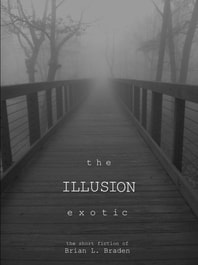 I hope you enjoyed this installment of THE CAVE. It will continue tomorrow on The Illusion Exotic and conclude on Halloween! Can't wait to find out what happens? You can get The Illusion Exotic here, featuring The Cave and other short stories. #shortstory #horror #halloween #spooky #western #serial *** If you enjoyed this blog, please like the post and leave a comment or if you're feeling brave, share it on social media. This platform is my entire advertising budget and is how I share the word on my books. Also visit my Facebook, my author page and check out my photography book from America Through Time, "Abandoned Wiregrass: The Deepest South's Lost and Forgotten Places." Halloween is one week away. I'd like to start a tradition on the Illusion Exotic, by featuring a short story from my compendium "The Illusion Exotic". I'll run an installment each day leading up to Halloween. I hope you enjoy it. THE CAVE A former Civil War soldier embarks on a quest on behalf of his former commander. He expects to find outlaws and gunslingers in the high deserts of New Mexico, but instead stumbles upon death incarnate. "The Cave", & "The Illusion Exotic, "Copyright 2016 Brian L. Braden The man in black leaned against the porch railing, patiently contemplating the purpose of his summons. Twirling his handlebar mustache, he admired the late spring maelstrom raging high above on Pikes Peak. Snow erupted off the upwind slope in sun-gilded plumes, blending into rolling clouds above the summit. The turmoil above contrasted to the calm where he stood a mile below. He understood the illusion of tranquility, of how quickly death could descend and deliver an unexpected blow. Squinting against the morning sun, deep creases etched his weathered face with shadows as dark as his drover coat and broad hat. The man in black seemed to soak the light from the morning air, testifying to the civilized world here stood a man of consequence, a man of purpose. He merely thought of himself as a man of duty. Duty drew him to the eastern Rockies, the slopes just coming back to life after a bitter winter. Most of the snow across the plains had already melted, transforming the streets of Colorado Springs into mud, confounding wagons and soiling the finest petticoats. He noticed quite a few petticoats and top hats, strangely out of place in a new frontier town. English tourists and English money saturated the city, driving prices as high as Pikes Peak. As the fresh scars of the Civil War began to heal, gentlemen and ladies from the finest eastern families and European nobility came west, deposited in Denver by the Kansas-Pacific Railroad. They journeyed the rest of the way courtesy of General Palmer’s Denver and Rio Grande Railway. Some came to see the vanishing frontier and gaze upon the majestic Rockies. Others came to hunt the plentiful trophy game in the high country. The one thing not plentiful here was liquor. General Palmer didn’t tolerate alcohol in his new town. He harbored deep respect for his former commander, but still brought enough good rye to keep him warm during his stay. He had some fine tobacco in his hotel, too. As bad as he wanted for a cigarette, he supposed this would be a bad place to roll one. The covered porch wrapped around a spacious whitewashed building, which could have been mistaken for a fine resort hotel. Perched between worlds, the majestic mountains formed the hospital’s backdrop and the plains fell before it like an endless gown. Frail, wispy figures clad in white robes surrounded the man in black like morning fog encircles a granite peak. They, too, existed between worlds; living ghosts slumped in wheelchairs across the porch. Nurses drifted among the pale figures carrying blankets and hot tea. Occasional coughing spasms racked the silence. The patients deflected their gazes away from him. Perhaps he’d dealt death for so long, he’d come to resemble it. During the war, General Palmer once confided why he always kept him by his side. Palmer believed the man in black could sense when death lingered nearby, attributing this gift for keeping the General’s feet firmly planted in this world. He told the General it wasn’t a gift. When you got the smell of death deep in your lungs day in and day out, it eventually stuck there like molasses on the inside of a barrel. After a while, you could smell it coming. Just when a man thought he’d exorcised death from his mind for good he’d get a whiff of it again, strong and fresh. Most men who fought the war, like the General, spent the rest of their lives trying to avoid death. Thinking it a fool’s errand, the man in black quit trying long ago. In fact, he’d gotten so damn good at smelling death coming he made it his profession. Death permeated the clean, crisp mountain air. It wasn’t the hot, violent smell of the battlefield or a gunfight, but the cool, sterile odor of antiseptic decay. While expensive and beautiful, this place wasn’t a fine resort hotel and these weren’t English tourists. The patients came for a second chance at life and hoped to find it here at Craigmor Sanitarium. Neither stricken with consumption, or visiting a patient, he had an appointment with his former commander General William Jackson Palmer. Palmer’s personal secretary, a small man with a penchant for small details, emerged onto the porch and whispered to the man in black, “Mr. Knight, the General will be out shortly.” Silas H. Knight nodded and resumed chewing on a toothpick as the little man scurried off. A few moments later, a group of well-dressed men emerged onto the porch, Palmer at their center. “Gentlemen,” the General addressed them. “I feel certain I’ve laid to rest any doubts this grand institution, nestled here amidst our Lord’s natural beauty, is at the forefront of modern medicine. I am confident this glorious place of healing can only prosper and thrive under the stewardship of such a distinguished board of trustees. Now, if you will please excuse me, I must attend to other matters. I leave you in the hands of Doctor Edwin Solly, with whom you are already acquainted, to field any further questions.” He shook hands with each and bid them thanks and farewell. His smile cooled as he turned and made his way across the porch to Knight. “Sergeant, it does please me to see you again.” “General.” Knight touched the brim of his hat in a ghost of a salute. “How was your journey? Are you hungry? The kitchen staff here is excellent.” “No thank you, sir. The hotel has a fine breakfast, even if it is a bit rich for an old soldier.” “Ah, yes,” Palmer agreed. “The Antlers is the finest hotel west of St. Louis. I hope you find it agreeable.” “Most certainly.” Palmer motioned off the porch. “Well then, Sergeant, will you do me the honor of accompanying me in a stroll across the grounds while we discuss why I asked you here?” The two men made no small talk as they strolled in silence down the hill, past the garden toward the open prairie. Palmer stopped and surveyed the wide-open rolling grasslands stretching east, interrupted only by the distant town nestled among the foothills. A gust of wind stirred the late morning calm as the mountain storm behind them began to draw energy from the warming grasslands. Knight watched his former commander out of the corner of his eye. The steely look on Palmer’s face transported him back to battlefields long ago, and a thousand miles away. He knew deep inside that Palmer still fought the war. The general would fight for the rest of his life to purge the smell of death from his nostrils. “Silas, I trust you are in good health and your constitution is as firm as ever.” Palmer looked him up and down and nodded. “Yes sir, still fit enough.” “If my telegram was sufficient to lure you here then I can rest assured Kansas City holds no special bond for you?” Knight nodded. He had no bonds, other than to some inner code of honor he shared with a few men. Palmer was and would forever be his commander, loyalty bought and paid for with blood. Palmer nodded quickly and grinned. “Excellent." Palmer stretched his arm across the open grasslands, the way he did when he surveyed battlefields. Knight followed him, because unlike most Union generals, Palmer was a man of thought and action. A spy, the commander of the 15th Calvary Regiment, a former prisoner of war, and nemesis of General Lee, he was the most daring man Knight had ever encountered. “Colorado Springs is going to be the next St. Louis. I’m building railroads, but not out west, Silas. No, that is already happening.” He turned and motioned toward the giant peaks. “Instead, I’m building narrow gauge lines throughout the Rockies from Mexico to Canada. Not around them, mind you, but through them! In Washington, they see these great mountains as obstacles to uniting the continent. I see them as a source of wealth, the very backbone of the continent.” Knight listened as Palmer went on, detailing his plans for the Denver and Rio Grand Railway. To his former commander, it was simply a matter of breathing life into events already played out in his mind a thousand times. An engineer, the General visualized the end-state, and then applied scientific principles to make his vision reality. Now Palmer visualized pushing the American Empire across a virgin continent. “Science now allows us to engineer railways in places the ancients couldn’t have scraped a goat path. I have work camps scattered up and down the Rockies. These are lawless places, beyond territorial justice. If I can’t keep order, I can’t build the railroad.” Knight now understood why he’d been summoned. Palmer continued, “The camps are filled primarily with Mexicans, but there are some white men, mostly foremen and engineers mind you, at each location. There is liquor and whoring, I can’t prevent that. However, I can’t have these vices inducing strife with the local indians. The tribes, especially in New Mexico territory, are very different than those across the plains. They’re generally passive unless stirred to trouble. That, my old friend, is why I requested your services. Are you equal to the task?” “I understand, sir.” Sergeant Silas H. Knight, former scout of the 15th Pennsylvania Calvary Regiment would ride forth once again at the bidding of his general. “Very good. I knew I could count on you. I’ll pay well above what you earned in Kansas City. My personal secretary will handle the details.” “Yes, sir.” Ordinarily a hard man when it came to contract negotiations, Knight simply accepted his former commander’s word. “I hope your instincts are as sharp as ever, for I must request that you depart immediately. I received word this morning of trouble near the railhead in Espanola, in northern New Mexico. There is a territorial marshal there, a certain Thomas Wellsby, but he is a drunkard and a liar. I’m making you a deputized agent of the railroad. Under territorial law you’ll have jurisdiction in all matters regarding the Denver and Rio Grande Railway.” Palmer leaned toward Knight in confidence. “Espanola is the lynchpin for the Chili Line, the railroad stretching from Raton across northern New Mexico. Therefore, all matters in Espanola are in some regard the jurisdiction of this railroad.” “Will Wellsby be a problem?” Knight inquired. “He’ll see your mettle and likely stay out of your way. However, he is not above backstabbing, so tread carefully. Ascertain the situation in Espanola and, if he is involved, deal with him as necessary. And I suspect he is involved. “I want law and order established there, one way or another. When you are through in Espanola, move north or south along the rail line from Santa Fe as you deem fit. Let your reputation move ahead of you, if you take my meaning.” Palmer gestured to the well-worn grips of Knight’s .44 caliber Colt pistols. A cold gust of wind suddenly blew from the west, rocking Palmer slightly. Knight’s heavy black oilskin drover barely ruffled. The general turned and looked back at the sanitarium and the gray mountains beyond. The storm slowly descended onto the plains, darkening the blue morning sky and casting a shadow over Palmer’s face. “I have enemies. Not just the railroad barons in Denver, but in Washington. They want to see my narrow gauge railway fail. Lackeys in Congress try to block me and I suspect the work camps are filled with saboteurs. I believe Wellsby is one of them. “I fear the old world is here, its sins and demons have followed us to the New World. The war showed us that, Sergeant. We must shine the light of freedom and faith into the all the dark corners. We must not let those demons gain a foothold in this clean, bountiful land.” Knight did what he always did when his general waxed philosophically: nodded and kept quiet. He’d never been to the Old World, but he knew people were the same, whether white, negro, indian, or Mexican. Most were bad, few were good. And some were damned. (to be continued tomorrow) 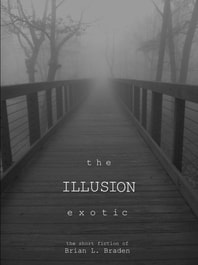 I hope you enjoyed this installment of THE CAVE. It will continue tomorrow on The Illusion Exotic and conclude on Halloween! Can't wait to find out what happens? You can get The Illusion Exotic here, featuring The Cave and other short stories. *** If you enjoyed this blog, please like the post and leave a comment or if you're feeling brave, share it on social media. This platform is my entire advertising budget and is how I share the word on my books. Also visit my Facebook, my author page and check out my photography book from America Through Time, "Abandoned Wiregrass: The Deepest South's Lost and Forgotten Places." |
Archives
July 2023
Categories
All
|
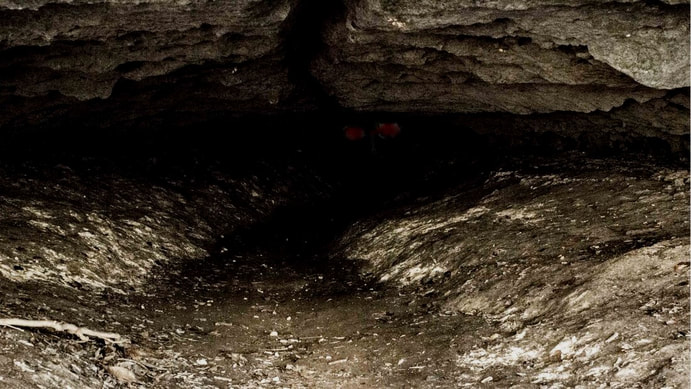
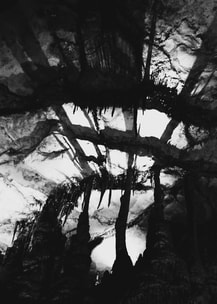
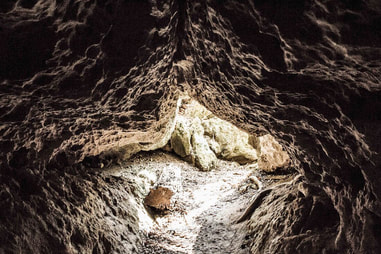
 RSS Feed
RSS Feed